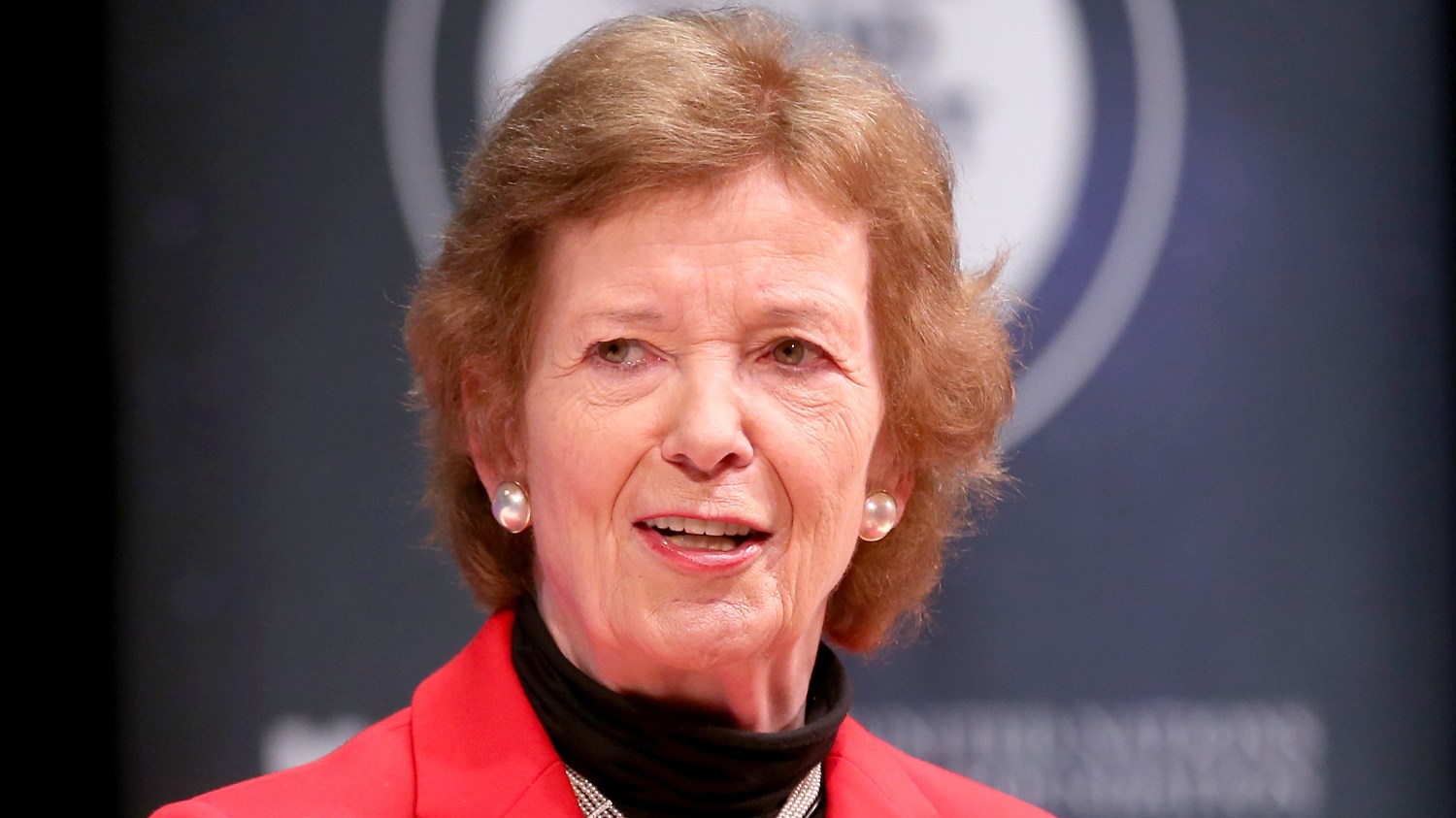Aoife Kelleher reveals how interviewing the inspirational former Irish president for a documentary about her life was like doing the Leaving Cert all over again
Lauren Murphy, The Sunday Times
July 7, 2024
It took Mary Robinson about 12 hours, all in all, to tell her entire life story to Aoife Kelleher. The big task for the director and documentary-maker was then distilling those striking tales from a remarkable life into a cohesive and watchable 90-minute film.
The result of years of interviews, travel, trawling the archives and mapping out the 80-year-old’s story is Mrs Robinson, Kelleher’s new documentary about the Mayo woman who would make history by becoming Ireland’s first female president in 1990.
“She certainly put me through my paces. Doing 12 hours of interviews with someone as experienced and knowledgeable as she is — to some degree, it was like sitting the Leaving Cert all over again,” Kelleher says, laughing.
“You have to remember the dates, you have to remember the people involved, and she’s certainly not a woman who’d be impressed if you weren’t on your brief.
“I spent so much time in Chapters [book shop], getting my hands on every single biography that I could and digesting them all during the pandemic. So I think my memory has certainly improved over the course of making this documentary, at least.”
The idea of making a film about Robinson was “very attractive” to Kelleher, whose previous work includes One Million Dubliners, her excellent 2014 documentary about Glasnevin cemetery, as well as Strange Occurrences in a Small Irish Village, about Knock.
“I was eight in 1990 and, not to overstate it, but it really felt like a moment when everything was possible for young women, for the LGBT+ community, for lots of different people who had felt shut out of various avenues in Ireland,” she says.
“Politics had seemed like it was the domain of a certain kind of predominantly middle-class man, and very occasionally their daughters. Suddenly, you have this outspoken human rights lawyer who’s speaking on progressive issues like reproductive rights, or the right to legal aid and legal representation, or the right for women to sit on juries — and there’s this vista of an entirely different kind of society.
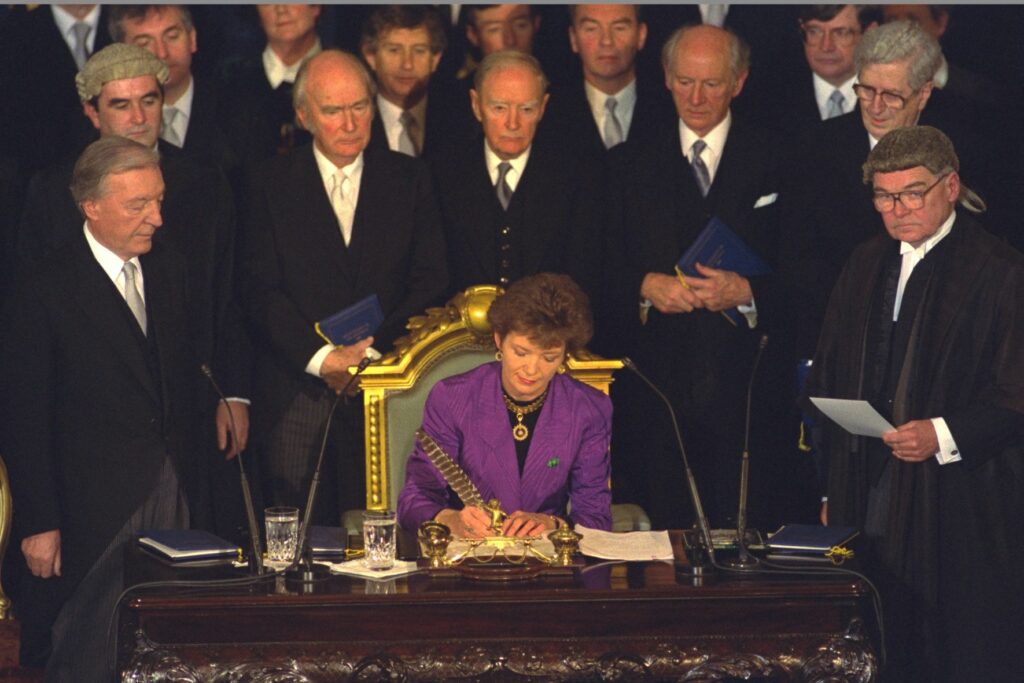
“So while I mightn’t have been aware of every aspect of that in 1990, there was this sense of a country opening up to new possibilities. And I thought it was a story worth telling.”
Kelleher has always been drawn to the art of storytelling, but says she gravitated towards documentaries after briefly considering drama when she graduated with a film and broadcasting degree.
“What’s great about a documentary is that you get to sit down with people and ask them really in-depth questions and have the kind of conversations that you very rarely have with people. I am terrible at small talk — I just love deep-and-meaningfuls,” she says, grinning.
“There’s probably a social justice aspect to it as well, insofar as I love stories about underdogs, about resilience and about people making a difference, really. I think that drama gets all the glory and all the glitz, but documentary is so meaningful.”
She and her producer Cormac Hargaden were among several film-makers to pitch the idea of a documentary to Robinson. “We really wanted to tell a very unvarnished story,” says Kelleher, musing on why the former president ultimately chose them.
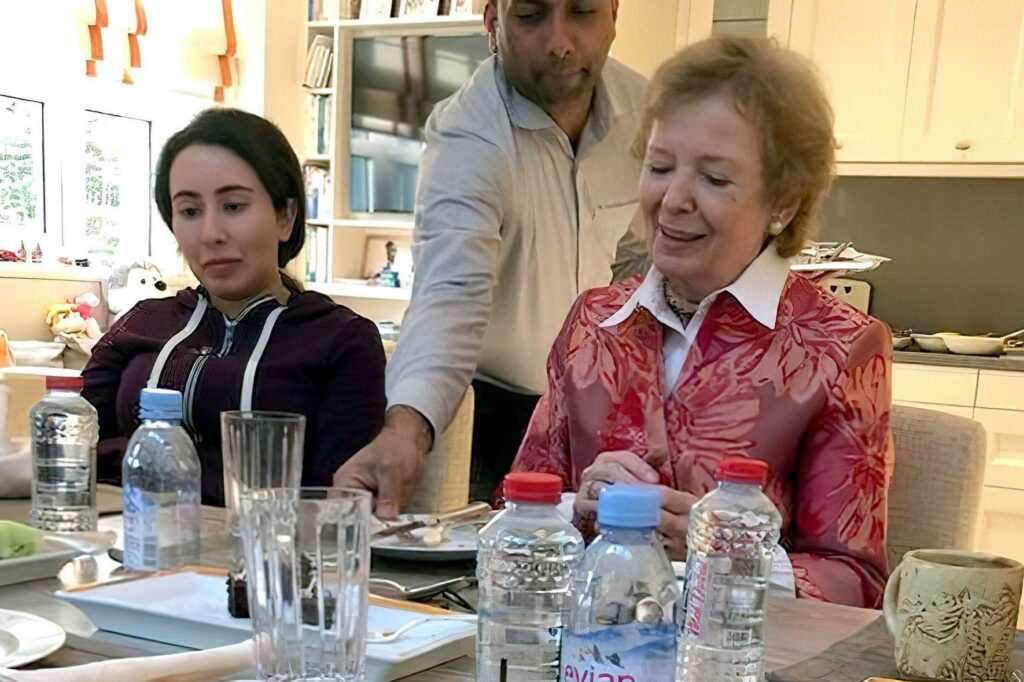
“We wanted to give her the chance to tell her own story, to show the challenges and the obstacles that she’d faced — and also the controversies that she had been enmeshed in at various moments, whether that was her outspokenness on the so-called War on Terror, or the mistakes that she had made herself.
“I think she liked the fact that we were going to tell a warts-and-all story about her life and times and career.”
Some of those mistakes are referenced in the film, including her controversial statement around the disappearance of the Emirati princess Sheikha Latifa in 2018, and her premature resignation from the Irish presidency in order to take up a role as the UN high commissioner for human rights.
Mrs Robinson also examines the former president’s upbringing in Ballina, as well as her work as a human rights lawyer and the roles that she has undertaken since departing Aras an Uachtarain — more recently as a climate activist.
There are also contributions from family members, including her son Aubrey and her husband of more than 50 years, Nick — a former cartoonist whom Robinson’s parents did not approve of her marrying.
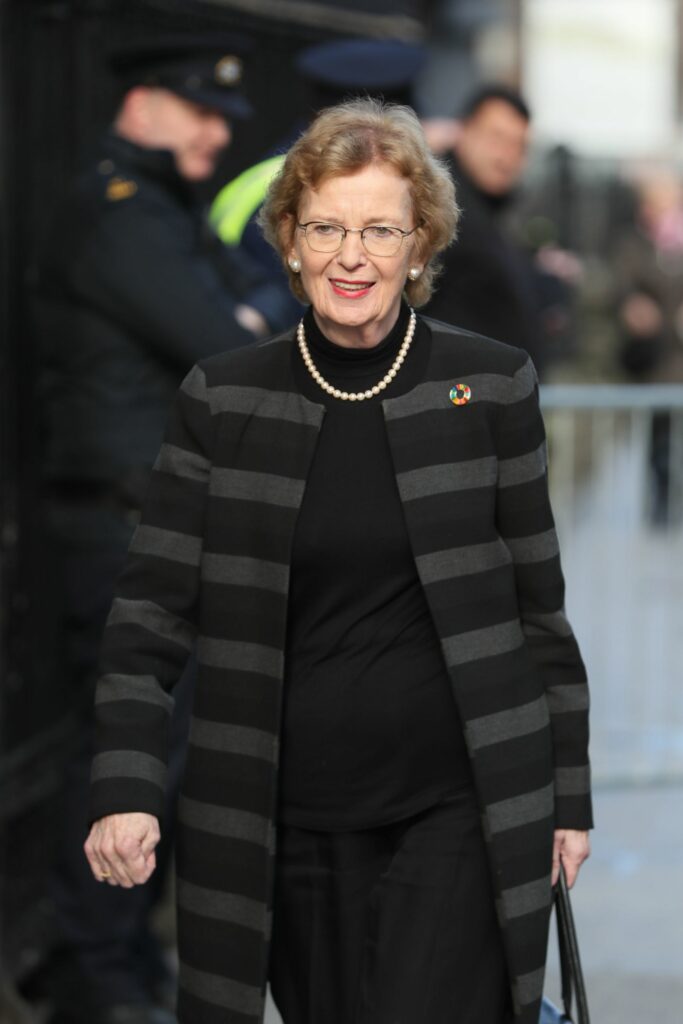
“I was really delighted that Nick was willing to take part in the documentary actually, because since his early outing on The Late Late Show during the presidential campaign he’s someone who has really avoided the limelight,” Kelleher says.
“I think he has been such a supportive partner to Mary, and his support has enabled her to be as vociferous and outspoken as she is. So I was delighted that he overcame his reluctance to take part, because theirs is actually a great romance.”
There are also interviews with Richard Branson and Peter Gabriel, Robinson’s colleagues in the Elders, the group of world leaders that she co-founded with Nelson Mandela in 2007. Branson refers to her as someone who “works incredibly hard, but she’s also great fun”.
He said: “We had a list of potential people [for the Elders] that we thought had high moral authority in the world, and Mandela turned to me and said: ‘Do you have Mary Robinson on the list?’”
Branson said Robinson is “relentless” in tackling global issues. “There is nobody I’ve ever met who is more passionate about climate change and human rights,” he said.
Robinson, who chairs the Elders, told the film-makers: “Listening to Nelson Mandela, I realised, this is what I want to do for the rest of my life.”
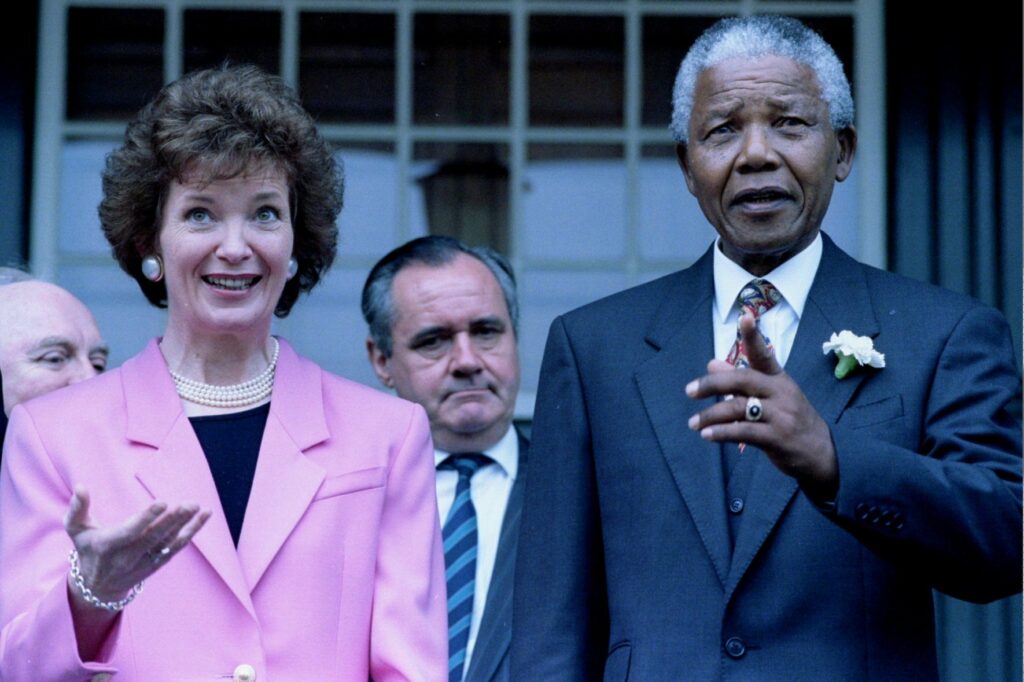
In the documentary Robinson said that she made “a very big mistake” by getting involved in the case of a runaway princess who tried to flee the United Arab Emirates six years ago.
She said she had been “completely misled” over the circumstances of her 2018 visit to Dubai in which she was photographed with Sheikha Latifa bint Mohammed al-Maktoum.
Latifa, the daughter of Sheikh Mohammed bin Rashid al-Maktoum, the ruler of Dubai, had failed months earlier in an attempt to escape the UAE after claiming she had suffered years of abuse at the hands of her family.
Following the meeting in Dubai, Robinson described Sheikha Latifa as a “troubled young woman” who needed psychiatric help, and said she believed the princess, then 33, was being well looked after. She was criticised over her comments and accused of supporting Dubai’s version of events.
Robinson said at the time that she had been asked to visit Dubai by Princess Haya bint al-Hussein, one of Sheikh Mohammed’s then wives and Latifa’s stepmother, whom she said she had known for a long time.
She agreed to the release of the pictures, which showed her sitting beside the princess, “to help the family to allow it to be understood that this is a family matter now and that [she] is in the loving care of her family”.
She told the film-makers: “I got a call from Haya al-Hussein. We were friendly in the sense that we were working together for the Global Humanitarian Forum. She told me that she needed to solve a problem of Princess Latifa. So I said, well, I could come and spend a night.
“Photographs were taken privately to prove life. They were never to be released to the public. I gave a very poor interview. I used the word ‘troubled’, which I shouldn’t have on-air.”
Robinson added that she had not been in touch with Princess Haya since she fled from Dubai to Britain in 2019.
“She rang me as soon as she got to London to say she had escaped,” Robinson said. “I haven’t been in recent touch with her. I feel, to say the least of it, that our friendship is no longer in existence.”
She recalls first learning about the September 11 terror attacks during a trip to the Inishkea Islands in Co Mayo. “I remember that boat ride back to the mainland and it was as if the sky had darkened,” Robinson said. “What was this going to do to the whole world of human rights?”
She added: “Initially the whole world was with America, but I realised that the language that President Bush was using was worrying.”
Robinson had accused the US of neglecting human rights during the war against terrorism. As the UN’s outgoing High Commissioner for Human Rights in 2002, she said pressure from America had prevented her from continuing in the job.
In the film Robinson said she was “very surprised” by the announcement that she was to be honoured by the Obama administration with a Presidential Medal of Freedom. During the ceremony at the White House in 2009, then US President Barack Obama called her an “advocate for the hungry and the hunted, the forgotten and ignored”.
At other points, David Norris, the independent senator, and members of the Irish Women’s Liberation Movement discuss her role in the decriminalisation of homosexuality and contraception, respectively.
One of the most striking things about the film is that, even now, as she travels to various events and conferences in her role as a climate activist, Robinson continues to be passionate about the causes in which she believes — often to the point of becoming visibly emotional.
“That emotion is what’s powering her drive,” Kelleher says. “There’s no sense with Mary Robinson that she’s ever going to retire. There might be a perception of frailty, but she frequently travels alone and she’s still out there, campaigning on the issues that really matter to her. I do think that comes from a genuine place of emotion and passion.”
Much of Kelleher’s recent work has involved telling stories of impactful women, so Mrs Robinson is in keeping with that trend. Yet even now, she says, it is difficult to find a platform for those stories, pointing out that the radio documentary that she made about Majella Moynihan, the former garda recruit who was threatened with dismissal and forced to give up her baby after giving birth out of wedlock in 1985, was initially visualised as a TV or feature documentary.
“I did a master’s in women’s studies after my degree in film and broadcasting, and it really felt at the time, in the mid-2000s, that there was a real dearth of women’s stories everywhere,” she says.
“Women as protagonists seemed to be absent throughout culture, whether that was in literature, or in sport, or in drama. It’s been harder to get stories [about women] funded, actually.
“I’m making a documentary now about Justice for Magdalenes, and their activist campaign that brought about the apology and redress. I started trying to get it funded in 2015 and I’m only making it now. It took a long time to get Mrs Robinson funded, too. So it can be harder, even now, to tell women’s stories.”
It has been a long road in all respects, but the film went down well when it premiered at the Sundance Film Festival in January. Kelleher laughs as she recalls how Robinson “described herself as relieved” once she had seen it, and notes how the former president still has a “extraordinary network of contacts that I can only aspire to”, after she convinced Bono and Saint Sister’s Gemma Doherty to contribute a cover of Ivor Cutler and Linda Hirst’s song Women of the World to the film’s soundtrack. It seems that not even Bono can say no to Robinson.
The film, Kelleher says, is as much a document of Irish social and political history as it is the story of Robinson’s life. It just so happens that she was there for many pivotal changes over the past half-century or so.
“Her story is the story of Ireland; from this hugely inward-looking, ultra-conservative state to the outward-looking, multicultural and tolerant nation that we like to regard ourselves as,” she says.
“That journey is reflected in the life and career of Mary. And her outspokenness, her willingness to tell the truth no matter the consequences, and her willingness to reflect upon herself while also telling truth to power — I think that is all something that we should all aspire to.
“So yeah,” she adds, grinning widely, “‘Be more Mary’ is the message, basically.”
The Irish premiere of Mrs Robinson takes place at the Galway Film Fleadh on July 13
